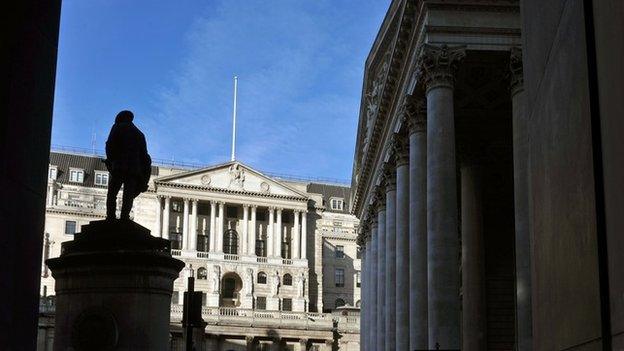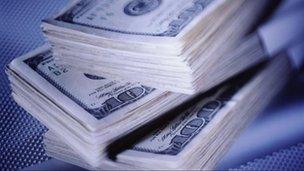Bank suspends worker in rigging probe
- Published

The UK's central bank is investigating whether staff knew about forex rigging
The Bank of England has suspended a member of staff as part of an investigation into potential rigging of the foreign exchange market.
The staff member has been suspended while it decides whether "internal control processes" were followed.
The UK's central bank said there was no evidence to date that its staff had colluded with forex rigging.
But minutes of meetings suggest Bank officials were aware of rigging attempts as early as 2006.
The minutes were published following a Freedom of Information request.
They show that a senior member of the Bank of England's staff was told of "attempts to move the market" and a meeting with senior foreign exchange dealers from some of the world's largest banks.
It a statement earlier, the Bank said it "does not condone any form of market manipulation in any context whatsoever".

Banks have paid $6bn for Libor rigging
It said an oversight committee will lead further investigations into whether bank officials were involved in forex market manipulation or were aware of manipulation, or at least the potential for such manipulation.
Travers Smith, a law firm, will prepare a report after the investigation. So far, the central bank has reviewed 15,000 emails, 21,000 chat room records and more than 40 hours of telephone recordings.
'As bad' as Libor
Meanwhile the Treasury Committee says it will quiz Bank of England officials, including governor Mark Carney, about the forex investigation when they make a scheduled appearance before MPs next week.
Speaking to the BBC, banking expert Philip Augar said the possible involvement of Bank staff in the forex scandal was "embarrassing" for the Bank of England, which acts as a regulator for the market.
Regulators have expressed concern that alleged forex manipulation could become the latest banking scandal.
Traders are alleged to have colluded in setting certain key exchange rates in the foreign exchange market, resulting in big profits.
The head of the Financial Conduct Authority, Martin Wheatley, said last month that currency manipulation was "every bit as bad" as the Libor scandal, where banks including Barclays, Royal Bank of Scotland and UBS paid fines totalling $6bn relating to Libor fixing.
Mr Wheatley told MPs 10 banks were helping the regulator with its investigations.
Reports seen by the BBC suggest banks knew of unusual currency trading four years before regulators began investigating possible manipulation of rates.
They suggest bank analysts had noticed sharp movements in exchange rates, and even warned their clients about trading at that time.
- Published4 February 2014
- Published31 October 2013
- Published1 November 2013